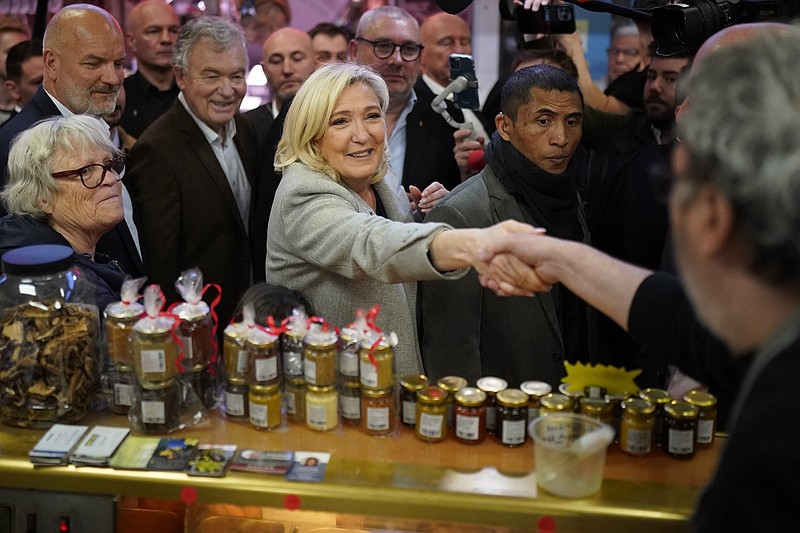PARIS -- President Emmanuel Macron said Friday that he has no fear of losing France's presidential election, despite far-right rival Marine Le Pen narrowing the gap in opinion polls days before the first-round vote.
Still, suspense is the watchword in Sunday's voting to choose the top two among a dozen contenders, with a predicted low turnout that could help decide the race.
"I have the spirit of conquest rather than the spirit of defeat," Macron, a centrist, said in an interview with RTL radio on the final day of campaigning. But he cautiously added, "Nothing is ever a given."
Le Pen, running in her third presidential race, has consistently placed second behind Macron in polls. She appeared to close the gap even further according to latest polls, which have given a difference of between one and six points between the two.
If the polls mirror election results, Macron and Le Pen would repeat the 2017 scenario, squaring off in a second round April 24. Macron won by a landslide five years ago, taking 66% of the vote to Le Pen's 34%.
This time, polls forecast the score to be much closer.
Le Pen has expended much energy to take the edge off her National Rally party in order to make it more appealing to voters. She has softened her image even more and made purchasing power the centerpiece of her campaign, but hasn't give up on her key themes: stopping the "migratory submersion" and "eradicating" political Islam.
"If Emmanuel Macron had enriched the country, excuse me, but we wouldn't be talking about purchasing power," Le Pen said at her final rally Thursday evening in the southwest town of Perpignan.
Macron denounced the far-right as "playing with the fears" of people, in an interview with French online media Brut on Friday evening. "When I look at far-right views, whoever the candidate is ... there are lots of links to conspiracy theories, and for two years of [the covid-19] pandemic, everything and its opposite was said, quite worryingly," he said.
"And then, there are short-term proposals, sometimes not making financial sense at all or demagogic, like on purchasing power," he added.
Macron stressed the unemployment rate decreased from about 10% to 7.4% during his term and vowed, if reelected, to reach "full employment."
He chose the online media to do his last interview before Sunday's vote in efforts to reach out to young voters, who tend to be less likely to go to the polls than the rest of the population.
Macron spoke to several French television and radio channels and newspapers this week in an final push to promote his policies. He cited his presidential duties -- notably his diplomatic efforts over the war in Ukraine -- to justify his absence during much of the campaign, which has been criticized by other candidates.
Pollsters say measuring the proportion of people who may not vote is a delicate task. The Odoxa polling firm suggested Friday that abstention could near a historic low level, with 27.4% of eligible voters staying home. That would be five points more than in 2017.
The record was in 2002 when 28.4% of voters failed to go to the polls in the first round, when then-President Jacques Chirac was competing with Le Pen's firebrand far-right father, Jean-Marie Le Pen, among others. Le Pen was defeated in the final round in a landslide.
"It could even be higher than this record," Erwan Lestrohan, director of studies at Odoxa, said in an interview Friday with The Associated Press.
In Perpignan on Thursday, Marine Le Pen sought to rally supporters including those mulling casting their ballot for novice far-right candidate Eric Zemmour, a former TV pundit whose bid for the presidency is based entirely on the migration issue. He stands in fourth place in the polls, behind far-left leader Jean-Luc Melenchon.
Information for this article was contributed by Catherine Gaschka and Sylvie Corbet of The Associated Press.
